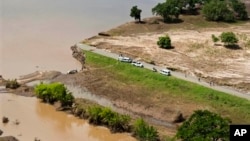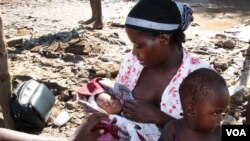JOHANNESBURG —
Floods in Mozambique have killed dozens of people and displaced hundreds of thousands. 55 people have been killed so far, according to the United Nations, which said it needs at least $15 million in relief aid to replace destroyed homes and help the mass of displaced victims.
The southern African country, a sea outlet for nine major river systems, sees passing tropical cyclones drop heavy rains, leaving it prone to severe flooding on a regular basis. This year floods washed through the country’s north, where the Zambezi river overflowed after heavy rains, and the south, where the Limpopo River basin flooded.
The Mozambican government, the South African government and aid agencies are working to help the afflicted.
Lola Castro, coordinator for the U.N. and other aid groups in Mozambique who anticipates damages could reach $27 million, says the first priority is to assist the more than 150,000 affected or displaced, and to make sure they have food, medication and a safe place to live.
“The second concern is ... not only millions of [destroyed] structures like roads and dikes and irrigation systems, [but] schools, health centers and other basic social infrastructure which will be needed to be repaired," she said.
In the northern flood zone, reporter Jinty Jackson encountered children drinking filthy water who hadn't eaten in more than a week, and the mother of newborn baby who had been born on the roof of a home engulfed by raging floodwaters.
Named Rofino, Jinty said, the four-day-old boy "was wrapped in blankets, and he was just sitting in his mother’s arms by the side of the road. And she was a bit too shy to speak, but her sister told me ... they had to escape the water, it sent them up to the roof. She started to say, ‘I’ve got pains, I’ve got pains,’ and the baby was born on the roof, during the night.”
In southern Mozambique, which was also hit hard by recent floods, medical aid group Doctors Without Borders established a health post in the city of Chokwe, where it is hosting some 40,000 people in temporary camps. More than 100,000 people were displaced by the floods in that area.
The worst Mozambique flood in recent memory happened in 2000 and left at least 700 people dead. The U.N.'s Castro says this year’s crisis shows that things are getting better. She cited improvements in the early warning system, in infrastructure and in response to such calamities.
“We can safely say that in the last 13 years, since the 2000 floods, there has been a huge improvement," said Castro. "[Each year] less and less people are affected by these floods and other events, because there is prevention – people have been settling in special areas which are less vulnerable. But there still is a lot that needs to be done.”
U.N. officials said the rainfall in January in Mozambique has been the heaviest since 2000.
Jinty Jackson contributed to this report from Maputo, Mozambique.
The southern African country, a sea outlet for nine major river systems, sees passing tropical cyclones drop heavy rains, leaving it prone to severe flooding on a regular basis. This year floods washed through the country’s north, where the Zambezi river overflowed after heavy rains, and the south, where the Limpopo River basin flooded.
The Mozambican government, the South African government and aid agencies are working to help the afflicted.
Lola Castro, coordinator for the U.N. and other aid groups in Mozambique who anticipates damages could reach $27 million, says the first priority is to assist the more than 150,000 affected or displaced, and to make sure they have food, medication and a safe place to live.
“The second concern is ... not only millions of [destroyed] structures like roads and dikes and irrigation systems, [but] schools, health centers and other basic social infrastructure which will be needed to be repaired," she said.
In the northern flood zone, reporter Jinty Jackson encountered children drinking filthy water who hadn't eaten in more than a week, and the mother of newborn baby who had been born on the roof of a home engulfed by raging floodwaters.
Named Rofino, Jinty said, the four-day-old boy "was wrapped in blankets, and he was just sitting in his mother’s arms by the side of the road. And she was a bit too shy to speak, but her sister told me ... they had to escape the water, it sent them up to the roof. She started to say, ‘I’ve got pains, I’ve got pains,’ and the baby was born on the roof, during the night.”
In southern Mozambique, which was also hit hard by recent floods, medical aid group Doctors Without Borders established a health post in the city of Chokwe, where it is hosting some 40,000 people in temporary camps. More than 100,000 people were displaced by the floods in that area.
The worst Mozambique flood in recent memory happened in 2000 and left at least 700 people dead. The U.N.'s Castro says this year’s crisis shows that things are getting better. She cited improvements in the early warning system, in infrastructure and in response to such calamities.
“We can safely say that in the last 13 years, since the 2000 floods, there has been a huge improvement," said Castro. "[Each year] less and less people are affected by these floods and other events, because there is prevention – people have been settling in special areas which are less vulnerable. But there still is a lot that needs to be done.”
U.N. officials said the rainfall in January in Mozambique has been the heaviest since 2000.
Jinty Jackson contributed to this report from Maputo, Mozambique.





